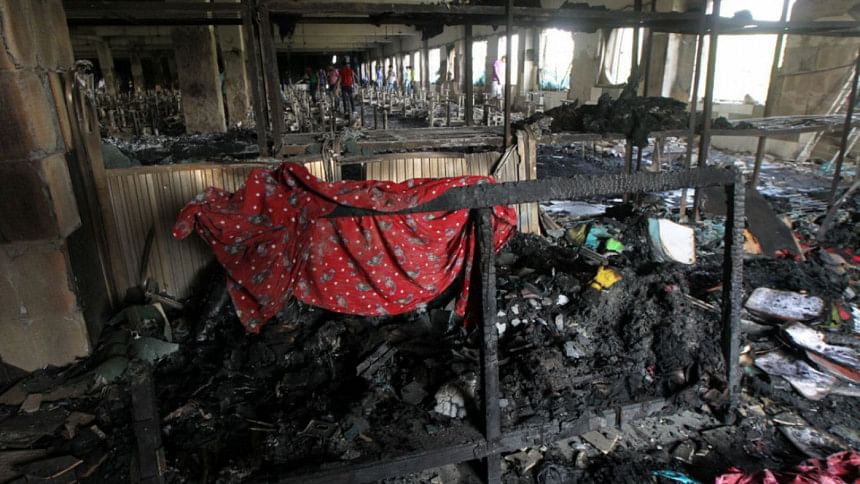Making strides in workers' rights

On November 24, 2012 a fire broke out in Tazreen Fashions garment factory in Ashulia that led to the death of at least 112 workers trapped in a building without adequate emergency exits. The Tazreen fire, followed by the Rana Plaza collapse five months later, was a watershed moment for the readymade garments (RMG) sector in Bangladesh. These catastrophes forced the global community to focus their attention on the working conditions of garment workers and led to a range of actions from international brands, governments, civil society and factory owners to tackle the issue of workplace safety. However, while the conversation has mostly focused on high-level internationally led initiatives such as the Accord and the Alliance, little has been reported on the impressive gains made by workers themselves to improve their working conditions and raise standards in the industry.
Worker-led organisations such as the Awaj Foundation have taken initiatives to train workers to raise awareness on their rights and responsibilities, and develop their capacity to bargain collectively and unionise. Enabling the workers themselves to articulate their demands has led to a much more nuanced conversation on improving working conditions that goes beyond the narrow focus on building and fire safety. It has allowed women workers (the majority of the workforce) to push for better maternity leave, quality day-care facilities for their children, paid time off to attend trainings, legal aid support, health care services for themselves and their children, and better accountability for workplace violence, among others.
At the same time, Awaj Foundation has undertaken efforts to improve relationships between workers and management at factories through social dialogue. A wide range of stakeholders, such as unions, participation committees, safety and welfare committees, human resource departments, management and other decision-makers were involved in the social dialogue process. The capacity of mid-level managers at factories had to be developed to raise their awareness on workers' rights through dialogue and trainings organised by donors. It has taken years of work inside and outside factories to develop trust between the different parties, but this collaborative approach has helped improve relationships between owners, management and workers and has created a better negotiating environment.
These dedicated efforts over the past five years are now starting to bear fruit. Last year there were 10 collective bargaining agreements in the RMG sector and Awaj provided support in developing six of them. These agreements are exemplary because the workers were able to negotiate for terms that go far beyond the minimum legal requirement. For example, while the labour law mandates a wage increase of five percent per year, workers were able to negotiate increases of eight percent or more; the workers are entitled to 11 days of festival leave every year by law, but these agreements included leave of 14 to 22 days; workers were also able to give input into developing menus for day-care centres in factories to ensure that their children are given nutritious food. In one large factory with over 7,000 workers they were able to negotiate that the employer would pay for the ultrasound check-ups of pregnant workers. This is quite an achievement considering that termination for becoming pregnant is still a widespread practice in the industry.
Workers were also able to argue for provisions that would help create a better environment for them to organise at the factories. They gained concessions on paid days off to attend union meetings and trainings, space allocation for a union office and better grievance handling mechanisms for workplace disputes and sexual harassment. The collective bargaining agreements also stipulate that monthly union dues will be collected directly by payroll and deposited into the union bank account. This process, while common for unions in developed countries, had never been implemented in Bangladesh, until now.
It is obvious that some of these measures will lead to increased costs for factory owners, at least on the surface, and these agreements were not easy to negotiate. In most cases, employers were not keen to do more than what is legally required of them. However, workers, with the support of Awaj Foundation, were able to convince factory owners and management that an adequate salary and facilities that allow workers to better take care of their health and their families are good for productivity at the factories. Good morale at work helps reduce absenteeism and attracts and helps retain skilled workers. What is good for workers is ultimately also good for business.
The examples set by these agreements concretely demonstrate that empowering workers with good negotiating skills and an environment that allows for collective bargaining can bring about enormous positive changes to working and living conditions of workers. The success of these collective bargaining agreements can be replicated in many more factories across the country in the coming years. While the global struggle for a living wage and better working conditions in the RMG sector continues, we hope that these agreements led by workers can help set examples of what is achievable and inspire others in the RMG sector in Bangladesh and across the world.
Farzana Nawaz is a capacity development consultant working with grassroots labour rights organisations in Bangladesh and an advisor to Awaj Foundation. Awaj Foundation is a workers' rights NGO based in Bangladesh that works towards improving working conditions in the RMG sector by strengthening the voice of workers.










Comments